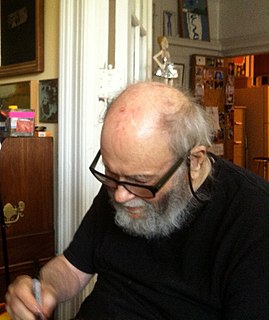A Quote by Naum Gabo
Art has no need of philosophical arguments, it does not follow the signposts of philosophical systems; Art like life, dictates systems to philosophy.
Related Quotes
The terminology of philosophical art is coercive: arguments are powerful and best when they are knockdown, arguments force you to a conclusion, if you believe the premisses you have to or must believe the conclusion, some arguments do not carry much punch, and so forth. A philosophical argument is an attempt to get someone to believe something, whether he wants to beleive it or not. A successful philosophical argument, a strong argument, forces someone to a belief.
Philosophy aims at the logical clarification of thoughts. Philosophy is not a body of doctrine but an activity. A philosophical work consists essentially of elucidations. Philosophy does not result in 'philosophical propositions', but rather in the clarification of propositions. Without philosophy thoughts are, as it were, cloudy and indistinct: its task is to make them clear and to give them sharp boundaries.
Logical investigations can obviously be a useful tool for philosophy. They must, however, be informed by a sensitivity to the philosophical significance of the formalism and by a generous admixture of common sense, as well as a thorough understanding both of the basic concepts and of the technical details of the formal material used. It should not be supposed that the formalism can grind out philosophical results in a manner beyond the capacity of ordinary philosophical reasoning. There is no mathematical substitute for philosophy.
In elaborating how "philosophy by showing" works, and in defending the idea that literature and music can contribute to philosophical "showing", I am also doing something more standardly philosophical. But I view most of the book as an interweaving of philosophy and literary criticism. If that entails a broadening of a standard idea of philosophy, it's a broadening I'd like to see happen.
Most artists, or at least most of the ones I know, deny having a philosophical outlook that they try to translate into their works. Some had thought of the work of Cezanne and others as being a 'painted epistemology.' But Cezanne himself denied this and Daniel-Henri Kahnwiler, the art critic and art dealer, insisted that none of the many painters he had known had a philosophical culture.
Philosophy - reduced, as we have seen, to philosophical discourse - develops from this point on in a different atmosphere and environment from that of ancient philosophy. In modern university philosophy, philosophy is obviously no longer a way of life, or a form of life - unless it be the form of life of a professor of philosophy.
Philosophical argument, trying to get someone to believe something whether he wants to believe it or not, is not, I have held, a nice way to behave towards someone; also it does not fit the original motivation for studying or entering philosophy. That motivation is puzzlement, curiousity, a desire to understand, not a desire to produce uniformity of belief. Most people do not want to become thought-police. The philosophical goal of explanation rather than proof not only is morally better, it is more in accord with one's philosophical motivation.
In my own version of the idea of 'what art wants,' the end and fulfillment of the history of art is the philosophical understanding of what art is, an understanding that is achieved in the way that understanding in each of our lives is achieved, namely, from the mistakes we make, the false paths we follow, the false images we have come to abandon until we learn wherein our limits consist, and then how to live within those limits.





































